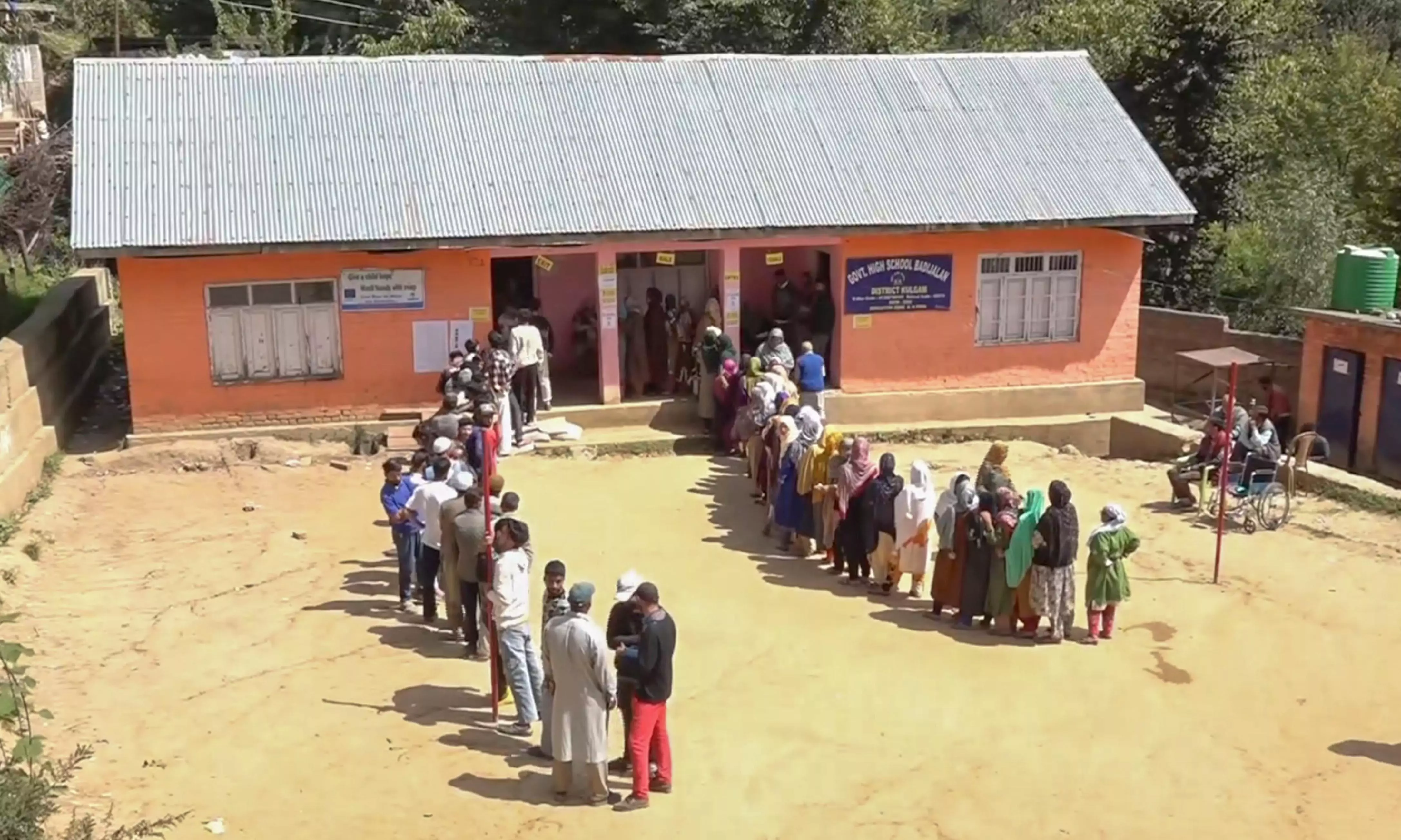The Injustice Has Been Undone; Say J&K Voters

Kulgam (Kashmir): “Mein taras raha tha (I was feeling pity). We were being denied the right to elect our representatives all these years. Finally, our worst wait is over,” said Abdur Rehman Bhatt, an ex-serviceman, as he emerged from the Kilam polling station in the Devasar area of Kulgam, a rice bowl of the Kashmir Valley, approximately 70-km south of capital Srinagar.
Polling was held in 24 segments of Jammu and Kashmir spread over four districts of the Kashmir Valley including Kulgam and four of those falling in the Jammu region of the Union Territory.
The Election Commission of India (ECI) officials said that 59 percent voter turnout had been recorded till 5 pm. They, however, hastened to add that the figure is likely to go up as data is still pouring in from remote areas of a few constituencies.
This correspondent saw long queues of voters outside the polling stations, not only in Kulgam but also in neighbouring Pulwama, Anantnag and Shopian districts. The region often referred to as ‘South Kashmir’ was until recently known to the outside world as being the hotbed of insurgency and a bastion of militant outfits.
Post-Burhan Wani killing, ‘South Kashmir’ had witnessed widespread violence and mayhem leaving dozens of people dead. Burhan Wani was a popular commander of Kashmir’s frontline militant organization Hizb-ul-Mujahideen gunned down along with another militant by the security forces on July 8, 2016, the incident that triggered a Valley-wide unrest lasting for about six months.
Kulgam is also known as a stronghold of Jamaat-e-Islami, Jammu and Kashmir which had been in the forefront of making the separatists’ poll boycott a success. The separatists stayed away from the democratic exercise following the Kashmiri separatist campaign burst into a major violence in 1989-90 on the premise the elections held under the framework of the Indian Constitution cannot be a substitute to the promised plebiscite.
But on Wednesday it were the former members and officer bearers of the banned right-wing organisation who along with its ‘hamdards’ or sympathisers were again on the forefront but this time in breaking the boycott shackles. Hence, once deserted, polling booths here and many other areas of South Kashmir came alive with serpentine queues of voters including many females.
Bhatt, not a Jamaat member or even a sympathiser, said that he expected the party he voted for to work towards the restoration of “our dignity” and to “get us back our rights”. He was referring to the abrogation of Article 370 by the Centre in August 2019. He also wanted the new government to address the issue of growing unemployment in J&K. “It should be its priority,” he said.
Vakil Ahmed, a resident of Pulwama’s Pinglina village, said, “It was very difficult to deal with the frustration as a great injustice had been done to us”. He was referring to the Assembly elections not being held in J&K for so long. He, however, also said, “The poll boycott calls of whether you call them pro-aazadi or separatist groups only damaged the interests of the Kashmiris. I wish they had not done it in the first place and revisited their decision many years ago.”
Bilal Ahmed Butt, another voter, said Pulwama leads in production of milk and other dairy products besides being known for its variety of fruits especially apples and world-class saffron. “But, unfortunately, Pulwama became known as the home of terrorism to the outside world. Today, it is lagging in many spheres of life and is one of the backward districts of J&K. We expect the new government will work towards taking it out of the mess it remained caught in for years,” he said.
The polling in 24 segments of the 90-member J&K Assembly was held amid tight security. J&K’s Chief Electoral Officer Pandurang K. Pole said that about 59 per cent voting was recorded in the first phase of polls. He added that the ECI had set up 3,276 polling stations with webcasting to ensure a fair and transparent voting process across all the 24 segments. Over 23.27 lakh voters were entitled to cast ballots to determine the fate of 219 candidates.
The second phase of the elections is scheduled to be held on September 25 and the third and final on October 1 whereas the counting of votes will take place on October 8.
The last Assembly elections in J&K were held in 2014. The erstwhile state was brought under the Governor's rule following the collapse of the coalition government of the regional People’s Democratic Party (PDP) and Bhartiya Janata Party (BJP) in June 2018. The following year, the Centre abrogated Article 370 of the Indian Constitution which envisaged special status to J&K for over seven decades.
The move was upheld by the Supreme Court in December last year. The five-judge constitution bench of the top court ruled that J&K special status had been a “temporary provision” and that removing it was constitutionally valid.
